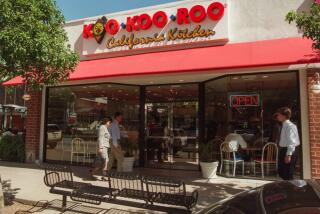El Pollo Loco Franchisees Sue the Parent Firm : * Litigation: They claim that some restaurants have had to close and that management hasn’t kept its promise to help with marketing, development of new products and expansion.
IRVINE — Eleven El Pollo Loco franchisees have filed a lawsuit against the charbroiled-chicken chain’s parent company, alleging that its management has failed to live up to goals for marketing, development of new products and expansion, attorneys said Friday.
As a result, 13 of the 49 El Pollo Loco restaurants operated by the disgruntled franchisees have closed, according to the lawsuit filed Wednesday in Orange County Superior Court. The suit seeks at least $90 million in damages.
James C. Verney, chief operating officer of the Irvine-based subsidiary of TW Holdings Inc., acknowledged that some franchisees have faced difficult times. But he added that the lawsuit is without merit and that “the people raising hell are the people, frankly, who have not paid the bills.”
The lawsuit blames El Pollo Loco’s parent for allegedly ignoring the chain, which it acquired in 1987. Instead of tending to El Pollo’s problems, the disgruntled franchisees say, South Carolina-based TW Holdings has poured most of its time and money into its other food operations, such as the Denny’s coffee shop chain.
“As a result of the acquisition . . . Pollo has been left a mere shell, unable to fulfill its obligations to its franchisees,” the lawsuit states.
The company has broken its agreement with the franchisees by not living up to promises to adequately advertise, develop market information badly needed by the franchisees, roll out new products and help franchisees pool their purchasing so they can take advantage of volume discounts, according to the suit.
The franchising operation has come to a virtual halt, and the company is falling far short of its goal of 500 restaurants by 1992, the suit states.
The El Pollo chain--which grew from a Mazatlan, Mexico, restaurant whose name in English means the Crazy Chicken--has grown fast in Southern California by capitalizing on its Latin origins and the health appeal of its process in preparing chicken over an open flame. Today, there are 117 company-owned and 101 franchised stores.
Revenues were $105 million in 1990, up 6.9% from $98.2 million in 1989. Income, however, declined to $8.7 million, down 30% from $12.4 million. The annual sales in an average store were off 10.5% at $906,000.
Verney said the company has had a harder time succeeding in other Southwestern states where many of the complaining franchisees have their restaurants, such as Arizona, New Mexico and Texas. He defended TW Holding’s management, saying the chain was unprofitable until TW took over.
And he said the expansion rate that was slower than earlier planned makes sense, given the tough economy.
“We’re not surprised by the litigation,” Verney said. “We’ve been working with a number of the franchisees that have been unhappy for some time.” There is “no question the sales have been disappointing” in some cities outside Southern California, but he added that company-owned stores have had trouble in places like Phoenix, too.
More to Read
Inside the business of entertainment
The Wide Shot brings you news, analysis and insights on everything from streaming wars to production — and what it all means for the future.
You may occasionally receive promotional content from the Los Angeles Times.










